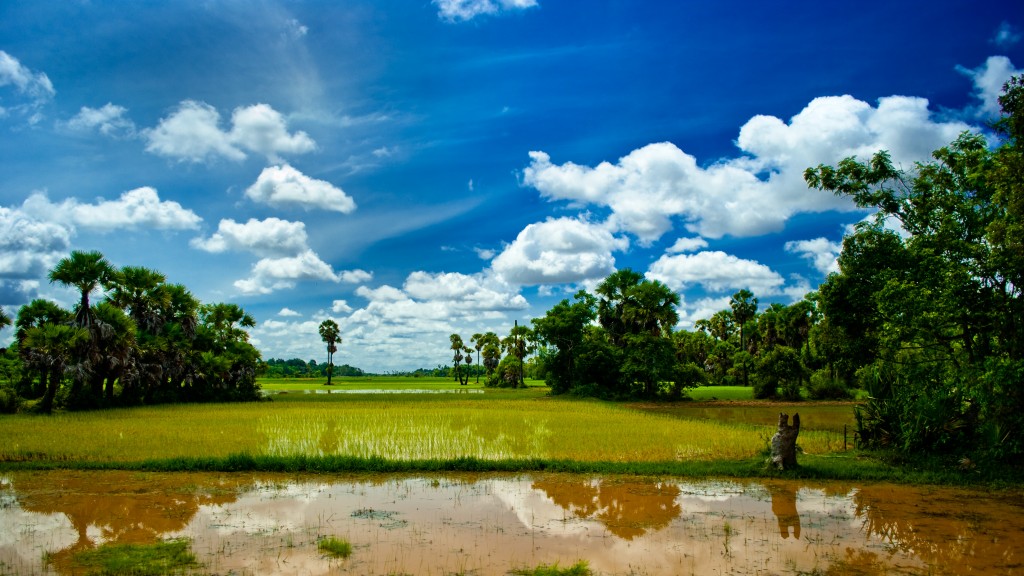
វាលស្រែ. រូបភាពថតដោយ Mark Zastrow កាលពីថ្ងៃទី២៧ ខែមិថុនា ឆ្នាំ២០០៩។ ក្រោយអាជ្ញាប័ណ្ណ CC BY-NC 2.0
នៅពេលដែលកម្ពុជាលែងអនុវត្តប្រព័ន្ធសង្គមនិយម និងចាប់ផ្តើមទទួលយកប្រព័ន្ធទីផ្សារសេរីនៅដើមទសវត្សរ៍ឆ្នាំ ១៩៩០ ប្រទេសនេះបានអនុវត្តកំណែទម្រង់ដីធ្លីជាបន្តបន្ទាប់ដែលមិនធ្លាប់មានពីមុន មកដែលបង្កើតបានជាមូលដ្ឋានសម្រាប់របបថ្មីស្រឡាងមួយនៃរដ្ឋបាលដីធ្លី។ នៅចុងទសវត្សរ៍ឆ្នាំ ១៩៨០ និងជាលើកដំបូងចាប់តាំងពីរបបខ្មែរក្រហមឡើងកាន់អំណាចនៅឆ្នាំ ១៩៧៥ កម្ពុជាបានចាប់ផ្តើមទទួលស្គាល់កម្មសិទ្ធិឯកជនលើដីធ្លី។1គោលនយោបាយដីធ្លីថ្មីមួយ ដែលបានចេញផ្សាយនៅខែមេសា ឆ្នាំ១៩៨៩ បានបញ្ជាក់ថា រដ្ឋជាម្ចាស់ដីធ្លីក្នុងប្រទេស ប៉ុន្តែពលរដ្ឋកម្ពុជាមានសិទ្ធិទទួលបានកម្មសិទ្ធិឯកជនលើដីធ្លីលំនៅដ្ឋាន និងកាន់កាប់ដីកសិកម្ម។2
ក្របខ័ណ្ឌច្បាប់របស់កម្ពុជា
នៅឆ្នាំ ១៩៩២ កម្ពុជាបានអនុវត្តច្បាប់ភូមិបាលថ្មី ដែលបញ្ជាក់ថា កម្មសិទ្ធិអាចទទួលបានតាមរយៈសន្តតិកម្ម កិច្ចសន្យា ឬដោយការបំលែងពី “ការកាន់កាប់បណ្តោះអាសន្ន” ទៅជា កម្មសិទ្ធិពេញលេញ។3 នៅឆ្នាំ ១៩៩៩ ក្រសួងរៀបចំដែនដី នគររូបនីយកម្ម និងសំណង់ ត្រូវបានបង្កើតឡើងដើម្បីគ្រប់គ្រង និងចាត់ចែងបញ្ហាពាក់ព័ន្ធនឹងការគ្រប់គ្រង និងរដ្ឋបាលដីធ្លីនៅកម្ពុជា។4 ក្រសួងមានមន្ទីររៀបចំដែនដី នគររូបនីយកម្ម និងសំណង់នៅទូទាំងខេត្ត-ក្រុង។
មិនយូរប៉ុន្មានក្រោយការបង្កើតក្រសួងនេះ ច្បាប់ភូមិបាលឆ្នាំ ២០០១ ត្រូវបានអនុម័ត។ ច្បាប់នេះបង្កើតបានជាមូលដ្ឋានសម្រាប់កំណែទម្រង់ដីធ្លីនៅកម្ពុជាបច្ចុប្បន្ន និងចែងពីបទប្បញ្ញត្តិថ្មីសំខាន់ៗ ដូចជា បទប្បញ្ញត្តិពាក់ព័ន្ធនឹងការចុះបញ្ជីដីធ្លី និងសិទ្ធិដីធ្លីរបស់ជនជាតិដើម។ ច្បាប់ភូមិបាលឆ្នាំ ២០០១ នៅជាធរមានរហូតដល់សព្វថ្ងៃ ទោះបីជាចាប់តាំងពីការអនុម័តដំបូង ច្បាប់នេះត្រូវបានធ្វើវិសោធនកម្មដោយក្រមរដ្ឋប្បវេណីថ្មីរបស់កម្ពុជាក៏ដោយ។ ច្បាប់ភូមិបាលគាំទ្រដោយអនុក្រឹត្យ ប្រកាស (សេចក្តីប្រកាស) សារាចរណ៍ណែនាំ និងសេចក្តីសម្រេចជាច្រើន ដែលបន្ថែមព័ត៌មានលម្អិត និងកំណត់ដំណើរការជាក់លាក់នៃការអនុវត្ត។
គោលនយោបាយដីធ្លីនៅកម្ពុជា
នៅឆ្នាំ ២០០១ រាជរដ្ឋាភិបាលកម្ពុជាបានចេញសេចក្តីថ្លែងការណ៍ស្តីពីគោលនយោបាយដីធ្លី។ គោលបំណងជាទូទៅ គឺសំដៅពង្រឹងសន្តិសុខកម្មសិទ្ធិដីធ្លី និងទីផ្សារដីធ្លី និងទប់ស្កាប់ ឬដោះស្រាយជម្លោះដីធ្លី គ្រប់គ្រងដីធ្លី និងធនធានធម្មជាតិប្រកបដោយសមធម៌ និរន្តរភាព និងប្រសិទ្ធភាព ព្រមទាំងជំរុញការបែងចែកដីធ្លីប្រកបដោយសមធម៌ (ឧទាហរណ៍ សម្បទានដីសេដ្ឋកិច្ច)។5 ដើម្បីសម្រេចបានគោលបំណងទាំងនេះ រដ្ឋាភិបាលបានបង្កើតកម្មវិធីរដ្ឋបាល គ្រប់គ្រង និង បែងចែកដីធ្លី (LAMDP) ដែលអនុវត្តដោយក្រសួងរៀបចំដែនដី នគររូបនីយកម្ម និងសំណង់។ ឯកសារបណ្តោះអាសន្នឆ្នាំ ២០០២ របស់រដ្ឋាភិបាលស្តីពីយុទ្ធសាស្ត្រក្របខ័ណ្ឌគោលនយោបាយដីធ្លី បានចែងលម្អិតពីសសរស្តម្ភគោលនយោបាយបីនៃរដ្ឋបាល ការគ្រប់គ្រង និងការបែងចែក។6
រដ្ឋបាលដីធ្លីពាក់ព័ន្ធនឹងបញ្ហានានា ដូចជា ការចុះបញ្ជីដីធ្លី និងការដំណោះស្រាយជម្លោះ។ ដីសម្បទានសង្គមកិច្ច ត្រូវបានអនុវត្តនៅក្រោមក្របខ័ណ្ឌសសរស្តម្ភនៃការបែងចែកដីធ្លី ជាមួយគោលដៅជំរុញការបែងចែកដីធ្លីប្រកបដោយសមធម៌។7 គោលនយោបាយគ្រប់គ្រងដីធ្លី មានគោលបំណងធានាការប្រើប្រាស់ដីធ្លី និងធនធានធម្មជាតិប្រកបដោយប្រសិទ្ធភាព និរន្តរភាព និងសមធម៌។8 បច្ចុប្បន្ន ទោះបីជាមានបទប្បញ្ញត្តិជាច្រើនដែលចែងពាក់ព័ន្ធនឹងបញ្ហាគ្រប់គ្រងដីធ្លី វឌ្ឍនភាពនៅក្រោមសសរស្តម្ភនៃការគ្រប់គ្រងដីធ្លី មិនសូវជាមានអ្វីគួរឱ្យកត់សម្គាល់ដូចដែលបានរំពឹងទុកនោះទេ។ ជាមួយនឹងសេចក្តីប្រកាសស្តីពីគោលនយោបាយដីធ្លីឆ្នាំ ២០០៩ រដ្ឋាភិបាលបានរំលឹកជាថ្មីមន្តទៀតអំពីសារៈសំខាន់នៃសសរស្តម្ភទាំងបីនេះ។
នៅឆ្នាំ ២០១២ រដ្ឋាភិបាលបានចេញសៀវភៅសស្តីពីគោលនយោបាយដីធ្លីជាមួយនឹងវត្ថុបំណងជាសំខាន់សំដៅលើកកំពស់ការប្រើប្រាស់ដីធ្លី ការគ្រប់គ្រងដីធ្លី និងការគ្រប់គ្រងធនធានធម្មជាតិសម្រាប់ការអភិវឌ្ឍសេដ្ឋកិច្ចសង្គមប្រកបដោយចេរភាព និងសមធម៌។ គោលនយោបាយដីធ្លីនេះ សំដៅសម្រេចឱ្យបានវត្ថុបំណងនេះតាមរយៈ ៖
- ការពង្រឹងសន្តិសុខកម្មសិទ្ធិដីធ្លីដើម្បីធានាទំនុកចិត្ត និងប្រសិទ្ធភាពទីផ្សារដីធ្លី
- ធានាការគ្រប់គ្រង ការការពារ និងការប្រើប្រាស់ដីធ្លី និងធនធានធម្មជាតិប្រកបដោយតម្លាភាព និងប្រសិទ្ធភាពដើម្បីធានាសមធម៌នៃការអភិវឌ្ឍសេដ្ឋកិច្ចសង្គម ទាំងនៅទីជនបទនិងទីក្រុង និងរក្សានិរន្តរភាពបរិស្ថាន និងទប់ស្កាត់ជម្លោះលើការប្រើប្រាស់ដីធ្លី
- ផ្តល់ការចង្អុលបង្ហាញកាន់តែច្បាស់លាស់ សម្រាប់ការបែងចែក និងប្រើប្រាស់ដីរដ្ឋប្រកបដោយតម្លាភាព និងសមធម៌ ទាំងសម្រាប់ទិសដៅសាធារណៈនិងឯកជន។9
ចាប់ពីពេលនោះមក រាជរដ្ឋាភិបាលកម្ពុជា បានបញ្ជាក់អះអាងសារជាថ្មីពីការប្តេជ្ញាចិត្តអនុវត្ត សៀវភៅសស្តីពីគោលនយោបាយដីធ្លី ដូចមានក្នុងយុទ្ធសាស្ត្រចតុកោណដំណាក់កាលទីបី និងផែនការយុទ្ធសាស្ត្រអភិវឌ្ឍន៍ជាតិ ឆ្នាំ ២០១៤-២០១៨។10 យុទ្ធសាស្ត្រ និងផែនការនេះបានគាំទ្រការប្តេជ្ញាក្នុងការបន្តអភិវឌ្ឍក្របខ័ណ្ឌគតិយុត្តិបន្ថែមទៀត សម្រាប់ការគ្រប់គ្រងដីធ្លី និងការប្រើប្រាស់ដីធ្លី បង្កើនសន្តិសុខកម្មសិទ្ធិដីធ្លីក្រោមរូបភាពជាការពន្លឿនការចុះបញ្ជីដីធ្លី និងការផ្តល់ប័ណ្ណកម្មសិទ្ធិ ជំរុញតម្លាភាព ប្រសិទ្ធភាព និងនិរន្តរភាពក្នុងការប្រើប្រាស់ និងការគ្រប់គ្រងដីធ្លី ព្រមទាំងជំរុញការបែងចែកដីធ្លីតាមរយៈដីសម្បទានសង្គមកិច្ច។11
វឌ្ឍនភាព និងបញ្ហាប្រឈម
កម្ពុជាសម្រេចបាននូវវឌ្ឍនភាពគួរជាទីកត់សម្គាល់ ក្នុងការអភិវឌ្ឍក្របខ័ណ្ឌច្បាប់ និងសមត្ថភាពស្ថាប័ន ដែលត្រូវការចាំបាច់សម្រាប់អនុវត្តរបៀបវារៈកំណែទម្រង់ដីធ្លីរបស់ខ្លួន។ ក្រសួងរៀបចំដែនដី នគររូបនីយកម្ម និងសំណង់ បានបង្កើតយន្តការរឹងមាំលើវិស័យជាច្រើន មានដូចជា ការចុះបញ្ជីដីធ្លីជាប្រព័ន្ធ ការចុះបញ្ជីដីជនជាតិដើម និង ដីសម្បទានសង្គមកិច្ច ទោះបីជាការអនុវត្តឱ្យបានពេញលេញ នៅតែជាការប្រឈមយ៉ាងណាក៏ដោយ។ ក្របខ័ណ្ឌផ្សេងទៀត ដូចជាសម្រាប់ការគ្រប់គ្រងដីរដ្ឋ ត្រូវបានបង្កើតឡើង ប៉ុន្តែមិនទាន់ត្រូវបានអនុវត្តជាប្រព័ន្ធនៅឡើយ។ ដូចដែលមានរាយការណ៍ជាញឹកញាប់នៅតាមប្រព័ន្ធផ្សព្វផ្សាយ និងដោយអង្គការមិនមែនរដ្ឋាភិបាល ប្រទេសកម្ពុជា បន្តប្រឈមនឹងបញ្ហាសំខាន់ៗជាច្រើនពាក់ព័ន្ធនឹងជម្លោះដីធ្លី និងការបណ្តេញចេញ។ ទន្ទឹមនឹងមានវឌ្ឍនភាពជាច្រើននៅក្នុងការបង្កើតគោលនយោបាយដីធ្លី ក្របខ័ណ្ឌគតិយុត្តិ និងរដ្ឋបាលដីធ្លីនៅកម្ពុជា វាច្បាស់ណាស់ថា រាជរដ្ឋាភិបាលកម្ពុជានៅតែមិនទាន់អាចសម្រេចបានគោលបំណងគោលនយោបាយរបស់ខ្លួននៅឡើយ។
ធ្វើបច្ចុប្បន្នភាពចុងក្រោយ៖ ១ វិច្ឆិកា ២០១៥
ឯកសារយោង
- 1. គណៈរដ្ឋមន្រ្តី (១៩៨៩). អនុក្រឹត្យលេខ ២៥ ស្តីពីការផ្តល់កម្មសិទ្ធិលំនៅដ្ឋានដល់ប្រជាជនកម្ពុជា ថ្ងៃទី ២២ ខែ មេសា ឆ្នាំ ១៩៨៩។
- 2. គណៈរដ្ឋមន្រ្តីនៃរដ្ឋកម្ពុជា (១៩៨៩). សេចក្តីណែនាំលេខ ០៣ ស្តីពីការអនុវត្តគោលនយោបាយប្រើប្រាស់ និងគ្រប់គ្រងដីធ្លី ថ្ងៃទី ៣ ខែ មិថុនា ឆ្នាំ ១៩៨៩។
- 3. ច្បាប់ភូមិបាល (១៩៩២), មាត្រា ៥៩។
- 4. ច្បាប់ស្តីពីការបង្កើតក្រសួងរៀបចំដែនដី នគររូបនីយកម្ម និងសំណង់ (១៩៩៩)។
- 5. រាជរដ្ឋាភិបាលកម្ពុជា (២០០១), សេចក្តីថ្លែងការណ៍របស់រាជរដ្ឋាភិបាលស្តីពីគោលនយោបាយដីធ្លី, ខែ ឧសភា ឆ្នាំ ២០០១; ក្រសួងបរិស្ថាន “ទស្សនៈវិស័យបរិស្ថានកម្ពុជា” http://geodata.rrcap.unep.org/all_reports/cambodia_081010.pdf
- 6. រាជរដ្ឋាភិបាលកម្ពុជា(២០០២), ឯកសារបណ្តោះអាសន្នស្តីពីយុទ្ធសាស្រ្តក្របខ័ណ្ឌគោលនយោបាយដីធ្លី; ក្រុមប្រឹក្សាអភិវឌ្ឍន៍សង្គម (២០០២). “យុទ្ធសាស្រ្តជាតិកាត់បន្ថយភាពក្រីក្រី ៖ ២០០៣-២០០៥.” http://www.imf.org/External/NP/prsp/2002/khm/01/122002.pdf
- 7. ដូចខាងលើ។
- 8. ដូចខាងលើ។
- 9. ក្រុមប្រឹក្សាគោលនយោបាយដីធ្លី (២០១២), របាយការណ៍រដ្ឋាភិបាលស្តីពីគោលនយោបាយដីធ្លី, ថ្ងៃទី ២៨ ខែ សីហា ឆ្នាំ ២០១២។
- 10. រាជរដ្ឋាភិបាលកម្ពុជា (២០១៣). “យុទ្ធសាស្រ្តចតុកោណដំណាក់កាលទី III.” ទំព័រ ២០។ http://www.cambodiainvestment.gov.kh/content/uploads/2013/11/2013-Rectangular-Strategy-III-En8.pdf; រាជរដ្ឋាភិបាលកម្ពុជា (២០១៤). “ផែនការយុទ្ធសាស្រ្តអភិវឌ្ឍន៍ជាតិ ៖ ២០១៤-២០១៨.” ទំព័រ ១៣០។
- 11. ដូចខាងលើ។

